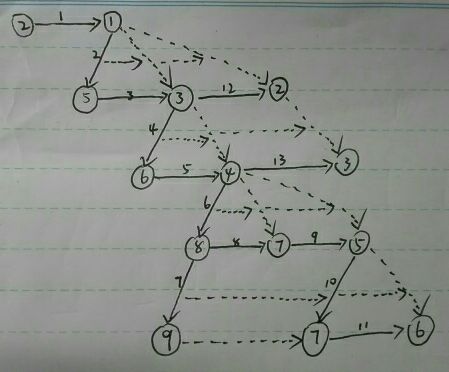题目大意
略。
分析
经典 DP,具体怎么 DP 的推荐看左神的书,这里解释一下为什么从后往前不断找第一个 dp[i] 减少并且位于 LIS 上的元素就可以找到字典序最小的 LIS。
下面以样例 2,1,5,3,6,4,8,9,7,5,7,2,3 来演示 smallEnds 数组的更新。

从图中可以直观地看出来,后更新的,并且位于 LIS 路径上的点,一定能取代被它更新的,并且位于 LIS 路径上的点。
代码如下

1 #include <bits/stdc++.h> 2 using namespace std; 3 4 #define INIT() ios::sync_with_stdio(false);cin.tie(0);cout.tie(0); 5 #define Rep(i,n) for (int i = 0; i < (int)(n); ++i) 6 #define For(i,s,t) for (int i = (int)(s); i <= (int)(t); ++i) 7 #define rFor(i,t,s) for (int i = (int)(t); i >= (int)(s); --i) 8 #define ForLL(i, s, t) for (LL i = LL(s); i <= LL(t); ++i) 9 #define rForLL(i, t, s) for (LL i = LL(t); i >= LL(s); --i) 10 #define foreach(i,c) for (__typeof(c.begin()) i = c.begin(); i != c.end(); ++i) 11 #define rforeach(i,c) for (__typeof(c.rbegin()) i = c.rbegin(); i != c.rend(); ++i) 12 13 #define pr(x) cout << #x << " = " << x << " " 14 #define prln(x) cout << #x << " = " << x << endl 15 16 #define LOWBIT(x) ((x)&(-x)) 17 18 #define ALL(x) x.begin(),x.end() 19 #define INS(x) inserter(x,x.begin()) 20 #define UNIQUE(x) x.erase(unique(x.begin(), x.end()), x.end()) 21 #define REMOVE(x, c) x.erase(remove(x.begin(), x.end(), c), x.end()); // 删去 x 中所有 c 22 #define TOLOWER(x) transform(x.begin(), x.end(), x.begin(),::tolower); 23 #define TOUPPER(x) transform(x.begin(), x.end(), x.begin(),::toupper); 24 25 #define ms0(a) memset(a,0,sizeof(a)) 26 #define msI(a) memset(a,0x3f,sizeof(a)) 27 #define msM(a) memset(a,-1,sizeof(a)) 28 29 #define MP make_pair 30 #define PB push_back 31 #define ft first 32 #define sd second 33 34 template<typename T1, typename T2> 35 istream &operator>>(istream &in, pair<T1, T2> &p) { 36 in >> p.first >> p.second; 37 return in; 38 } 39 40 template<typename T> 41 istream &operator>>(istream &in, vector<T> &v) { 42 for (auto &x: v) 43 in >> x; 44 return in; 45 } 46 47 template<typename T> 48 ostream &operator<<(ostream &out, vector<T> &v) { 49 Rep(i, v.size()) out << v[i] << " "[i == v.size() - 1]; 50 return out; 51 } 52 53 template<typename T1, typename T2> 54 ostream &operator<<(ostream &out, const std::pair<T1, T2> &p) { 55 out << "[" << p.first << ", " << p.second << "]" << " "; 56 return out; 57 } 58 59 inline int gc(){ 60 static const int BUF = 1e7; 61 static char buf[BUF], *bg = buf + BUF, *ed = bg; 62 63 if(bg == ed) fread(bg = buf, 1, BUF, stdin); 64 return *bg++; 65 } 66 67 inline int ri(){ 68 int x = 0, f = 1, c = gc(); 69 for(; c<48||c>57; f = c=='-'?-1:f, c=gc()); 70 for(; c>47&&c<58; x = x*10 + c - 48, c=gc()); 71 return x*f; 72 } 73 74 template<class T> 75 inline string toString(T x) { 76 ostringstream sout; 77 sout << x; 78 return sout.str(); 79 } 80 81 inline int toInt(string s) { 82 int v; 83 istringstream sin(s); 84 sin >> v; 85 return v; 86 } 87 88 //min <= aim <= max 89 template<typename T> 90 inline bool BETWEEN(const T aim, const T min, const T max) { 91 return min <= aim && aim <= max; 92 } 93 94 typedef unsigned int uI; 95 typedef long long LL; 96 typedef unsigned long long uLL; 97 typedef vector< int > VI; 98 typedef vector< bool > VB; 99 typedef vector< char > VC; 100 typedef vector< double > VD; 101 typedef vector< string > VS; 102 typedef vector< LL > VL; 103 typedef vector< VI > VVI; 104 typedef vector< VB > VVB; 105 typedef vector< VS > VVS; 106 typedef vector< VL > VVL; 107 typedef vector< VVI > VVVI; 108 typedef vector< VVL > VVVL; 109 typedef pair< int, int > PII; 110 typedef pair< LL, LL > PLL; 111 typedef pair< int, string > PIS; 112 typedef pair< string, int > PSI; 113 typedef pair< string, string > PSS; 114 typedef pair< double, double > PDD; 115 typedef vector< PII > VPII; 116 typedef vector< PLL > VPLL; 117 typedef vector< VPII > VVPII; 118 typedef vector< VPLL > VVPLL; 119 typedef vector< VS > VVS; 120 typedef map< int, int > MII; 121 typedef unordered_map< int, int > uMII; 122 typedef map< LL, LL > MLL; 123 typedef map< string, int > MSI; 124 typedef map< int, string > MIS; 125 typedef set< int > SI; 126 typedef stack< int > SKI; 127 typedef deque< int > DQI; 128 typedef queue< int > QI; 129 typedef priority_queue< int > PQIMax; 130 typedef priority_queue< int, VI, greater< int > > PQIMin; 131 const double EPS = 1e-8; 132 const LL inf = 0x7fffffff; 133 const LL infLL = 0x7fffffffffffffffLL; 134 const LL mod = 1e9 + 7; 135 const int maxN = 1e5 + 7; 136 const LL ONE = 1; 137 const LL evenBits = 0xaaaaaaaaaaaaaaaa; 138 const LL oddBits = 0x5555555555555555; 139 140 int N; 141 int arr[maxN], maxLen; 142 int ans[maxN]; 143 // dp[i] 表示以 arr[i] 结尾的最长递增子序列 144 int dp[maxN]; 145 // smallEnds[i] 表示LIS长度为 i + 1 的最小结尾 146 VI smallEnds; 147 148 int main() { 149 //freopen("MyOutput.txt","w",stdout); 150 //freopen("input.txt","r",stdin); 151 //INIT(); 152 scanf("%d", &N); 153 For(i, 1, N) scanf("%d", &arr[i]); 154 155 For(i, 1, N) { 156 auto it = lower_bound(ALL(smallEnds), arr[i]); 157 dp[i] = it - smallEnds.begin() + 1; 158 159 if(it != smallEnds.end()) *it = arr[i]; 160 else smallEnds.PB(arr[i]); 161 } 162 maxLen = smallEnds.size(); 163 164 int len = maxLen, nextLen = maxLen + 1; 165 rFor(i, N, 1) { 166 if(dp[i] == len && len == nextLen - 1) { 167 ans[len] = arr[i]; 168 --len; 169 --nextLen; 170 } 171 } 172 173 For(i, 1, maxLen) printf("%d%c", ans[i], " "[i == N]); 174 return 0; 175 }
